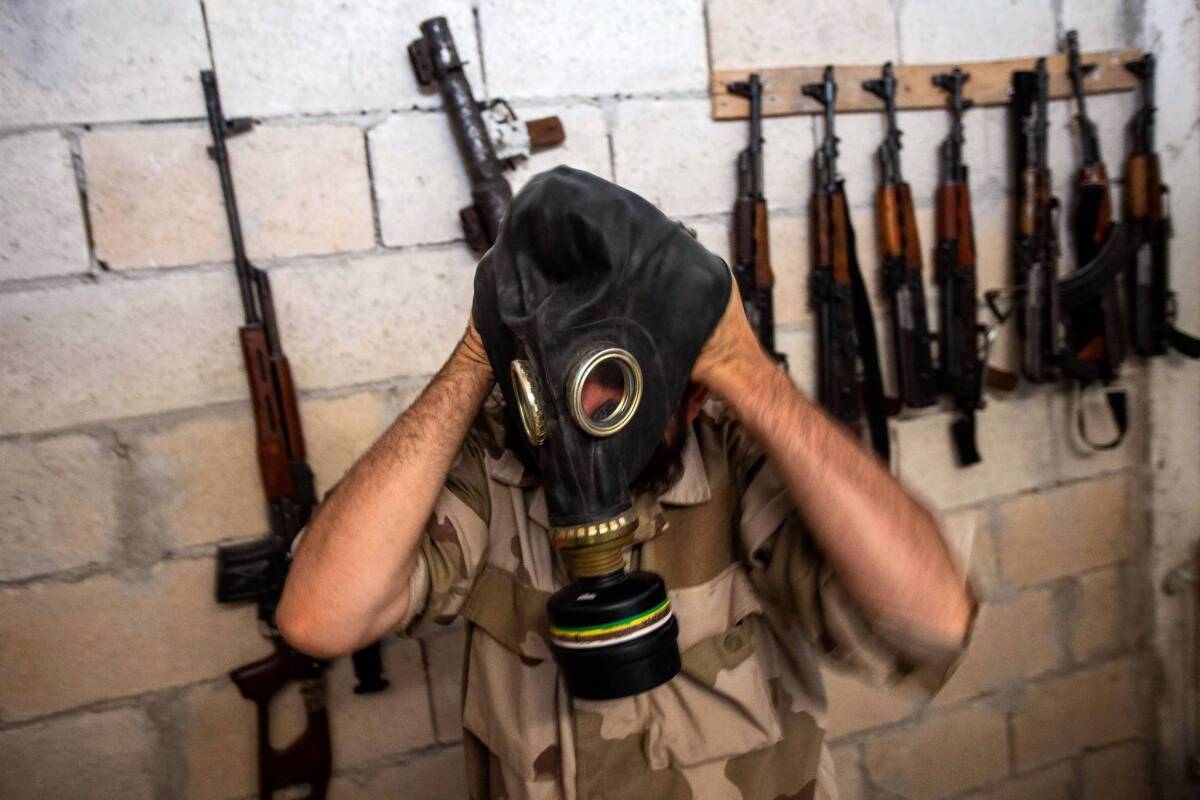U.S. has yet to deliver arms to Syria rebels

- Share via
WASHINGTON — More than two months after they were promised, U.S. weapons and ammunition have not reached America’s allies among the Syrian rebels, and their delivery date remains unclear, according to the Syrian opposition and Middle Eastern diplomats.
Khalid Saleh, an official of the Syrian Opposition Coalition, said in a telephone interview from Turkey that, while U.S. officials continue to promise arms, “nothing has come through yet, and we haven’t been given a specific date when we’ll see them.” The rebels, who have been pressing for months for anti-tank and antiaircraft weapons, have still not been told what kind of military aid they will receive, he said.
The White House announced June 13 that, in light of its conclusion that the Syrian government had used lethal chemical weapons in the 2-year-old civil war, the administration would provide “military assistance” to the rebels.
The deliveries, which White House officials promised in “weeks, not months,” were seen as a step toward greater U.S. military involvement. U.S. agencies have so far provided only nonlethal equipment, such as mobile radios, and $1 billion in humanitarian aid.
But, as the slow pace of the arms deliveries underscores, the administration remains conflicted about the move. Fearing that the arms could fall into the hands of Islamist militants who make up a growing part of the rebel forces, officials have been moving carefully to vet potential recipients of the arms.
The weapons are expected to be small arms and not the more powerful anti-tank and antiaircraft missiles rebels want. Saleh said coalition officials, who are in daily contact with U.S. officials, “have made our needs well known.”
The rebels are already receiving arms from Persian Gulf countries, and U.S. shipments are not expected to shift the balance in the war. But the move was intended to strengthen Washington’s ties to the rebels and send a message to the Syrian government, as well as its Iranian and Russian allies, that the United States could increase its involvement.
Though the White House announced in May that it would begin military assistance, it has not acknowledged publicly that it will send arms. But lawmakers have spoken publicly about the plans, and administration officials have also confirmed them.
Spokesmen for the CIA and White House declined to comment.
A diplomat from a Middle Eastern country, who declined to be identified because of the sensitivity of the issue, also confirmed that the deliveries have not begun.
Andrew Tabler, a veteran Syria analyst at the Washington Institute for Near East Policy, said he reads the slow pace of deliveries as a sign of “Obama’s reticence to get involved.”
Even when the arms deliveries do begin, “I think what we see will be extremely incremental,” said Tabler, who advocates a more active U.S. role. “I don’t think we can anticipate any massive later shift in U.S. policy, and so I think the opposition will remain dissatisfied.”
Tabler noted that Sunday is the two-year anniversary of Obama’s declaration that Syrian President Bashar Assad should step down and Tuesday is the one-year anniversary of Obama’s warning to Damascus that the use of chemical weapons was a “red line” for the U.S. Both were indications of the administration’s desire to limit its involvement, he said.
Some lawmakers contend that Congress should step in to halt even the limited U.S. plans.
Last month, planning for the arms deliveries was held up by objections from the intelligence committees. Some members argued that the deliveries were pointless because they would be too little to make a difference, while others worried that they could be the first step toward American military entanglement.
The committees, which are consulted by the White House but don’t have formal power to block the administration, eventually acquiesced.
But Rep. Adam B. Schiff (D-Burbank), a member of the House Intelligence Committee and an opponent of arming the rebels, predicts that Congress will vote on whether to fund it. “If it were brought to a vote today it would go down,” he said.
Schiff said he believed only a massive supply of sophisticated weapons could change the course of the war. But even a limited supply of small arms could draw the United States deeper into the fighting because there would be a clamor for more help if the first deliveries didn’t produce results, he said.
More to Read
Sign up for Essential California
The most important California stories and recommendations in your inbox every morning.
You may occasionally receive promotional content from the Los Angeles Times.











